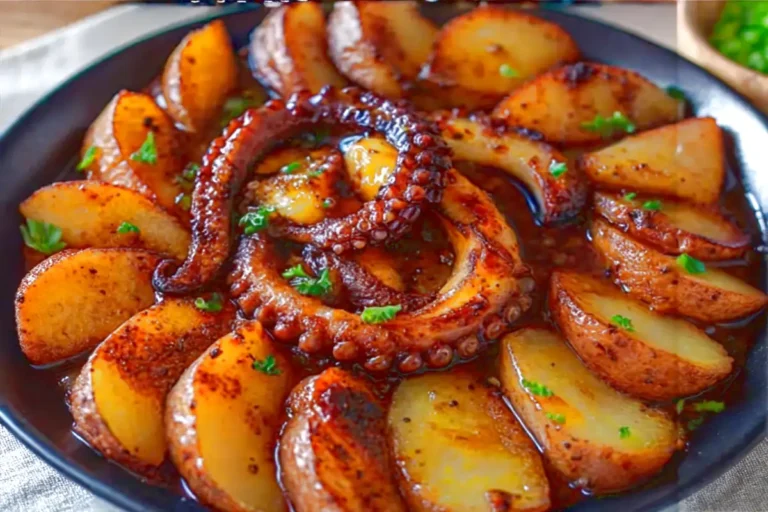A few summers ago, I found myself in a tiny fishing village on the coast of Sicily, face-to-face with a grilled octopus dish that changed my life. It was tender, smoky, and sitting on a bed of paprika-dusted potatoes that made me want to write poetry. I told myself, “How hard can this be?” Cut to me last weekend: wrestling a slimy octopus in my kitchen while frantically Googling what the heck a beak is.
So if you’re curious about grilled octopus but scared of turning your dinner into a rubbery sea monster, I got you. Here are the tips, stories, and cultural nuggets I wish someone had shared with me before I tried to channel my inner Mediterranean chef.
First: Frozen Octopus Is Not Cheating
If you’ve been scouring your local fishmonger for fresh octopus and feel like a failure settling for frozen—relax. Frozen octopus is actually your secret weapon. Why? Freezing breaks down some of the tough muscle fibers, which makes your final result way more tender. It’s like nature’s built-in meat mallet. Plus, you can stash it in the freezer until you’re ready for your culinary courage to kick in.
The Horror Movie Scene: Cleaning the Octopus
Let’s just say it: raw octopus looks like an alien lifeform. You’ve got tentacles, eyes, and something called a “beak” that’s exactly as terrifying as it sounds. Here’s what I learned:
- The eyes: Gelatinous little marbles. Use a sharp knife to remove them, and try not to scream.
- The beak: Located where all the tentacles meet, it looks like a tiny parrot beak. Pop it out carefully.
You can toss the head if you’re squeamish, but honestly, it’s edible and kinda tasty when cooked right. Waste not, want not.
Mediterranean Tip: Olive Oil Is Everything
In Greece, Spain, and southern Italy, octopus isn’t just food—it’s an art form. The trick? Don’t overthink it. You’ll need:
- Extra virgin olive oil (the real kind, not that blend you forgot about in the pantry)
- Bay leaves
- Thyme or marjoram
- Paprika (for smoky flair)
Heat the olive oil with your herbs until it bubbles gently, then drop in the octopus—head first. No water necessary. The octopus will release its own flavorful liquid.
Low and Slow: Patience, My Friend
This is not a “dinner in 15 minutes” situation. Think of it like a culinary spa day. Cook the octopus slowly, lid on, for about 45 minutes. Watch those tentacles go from stiff sea creature to relaxed, droopy deliciousness.
Pro tip from a Portuguese friend: “When the tentacles curl inward and start falling under their own weight, you know it’s ready.”
Meanwhile, Potatoes Deserve Respect Too
Boiling potatoes sounds easy until you do it wrong. I once served octopus with mushy, broken potatoes that fell apart like my self-esteem.
Here’s how to get it right:
- Always start with cold water
- Don’t salt the water (yet)
- Use waxy potatoes like Yukon Golds or baby reds
Bring them to a gentle boil (violent bubbles = skin explosion), and poke them with a fork to check for tenderness.
Secret Spanish Twist: Crispy Paprika Potatoes
While most Italians will serve plain boiled potatoes with octopus, I took a cue from Spain. Ever had patatas bravas? This is the same vibe, but simpler.
Once the potatoes are tender, peel them while they’re still warm (wear gloves unless you enjoy burning your fingerprints off), and slice into thick coins.
Then:
- Heat some olive oil
- Add a generous shake of paprika
- Fry the potato slices until crispy on both sides
Boom. You’ve got smoky, crispy little flavor pillows.
Let the Octopus Chill—Literally
Once your octopus is tender, don’t yank it out of the pot like a rookie. Let it rest in its own broth for 20 minutes. This relaxes the proteins and deepens the flavor. I used this time to panic-clean the kitchen and wonder if I should just order pizza.
The Grill Moment: Channel Your Inner BBQ Ninja
You’ve waited nearly an hour. It’s time to grill.
- Preheat your grill or grill pan until it’s very hot
- Slice off individual tentacles
- Grill each for 1 minute per side
- Squeeze over some lemon juice
If you’re feeling fancy, rub the grill with lemon before placing the octopus to prevent sticking—a trick I learned from a fisherman in Croatia.
Assembly: Octopus Meets Potato
Lay down a bed of those crispy paprika potatoes. Top with a few grilled tentacles. Drizzle everything with good olive oil and maybe a sprinkle of parsley.
That’s it. No foam. No tweezers. Just honest, rustic food.
Mistakes I Made So You Don’t Have To
- Rushing the octopus: Undercooked octopus is like chewing a bicycle tire. Wait it out.
- Boiling potatoes too hard: Mine looked like they got into a bar fight.
- Not cleaning properly: The beak is not a garnish.
- Skipping the rest time: I did once. Never again.
- Cheap olive oil: You will taste the difference.
Around the World With Octopus
- Japan: Octopus (tako) is often eaten raw in sushi or cooked into takoyaki (crispy batter balls filled with octopus and pickled ginger).
- Korea: San-nakji is raw octopus cut and served while still wriggling. Not for the faint of heart.
- Mexico: Pulpo a la gallega, heavily spiced and served with paprika and sea salt.
- Hawaii: Tako poke, marinated octopus chunks with soy sauce, sesame oil, and green onion.
Wherever you go, octopus is a celebration food. In Portugal, it stars in Christmas Eve dinners. In Greece, it hangs on clotheslines outside tavernas, drying in the sun like laundry before hitting the grill.
Final Thoughts From Someone Who Learned the Hard Way
Grilled octopus sounds fancy, but it’s really just about patience and good ingredients. Don’t let the tentacles intimidate you. Once you’ve done it, it’s shockingly simple—and stupidly delicious.
So go on. Get messy. Burn your fingers. Smell like the sea. And when you finally sit down to your plate of smoky, tender octopus and crispy potatoes, just remember: you earned this bite.
And hey, if it still goes sideways? That’s what delivery is for.







